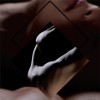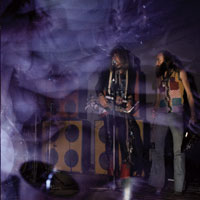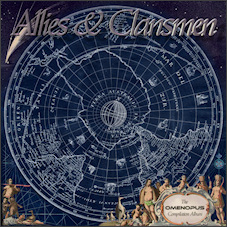 This album has been around since November 2012. So I’m a little late to the chorus of adulation. I’m doing my best not to read all the reviews that scroll up when I google Holly Herndon‘s name.
This album has been around since November 2012. So I’m a little late to the chorus of adulation. I’m doing my best not to read all the reviews that scroll up when I google Holly Herndon‘s name.
Is it awful to admit I had no idea?
Oh well. I didn’t have any idea, but when it was suggested I might like to review this, I was intrigued. I watched the video for the title track and single and was actually spellbound. Musically and visually this was arresting, beautiful stuff.
I wasn’t sure I could do it justice. I’m not a massive follower of the scene, I just catch snippets here and there. Maybe it is because I was told she lists Laurie Anderson as an influence, and I thought, well. I list Laurie Anderson as an influence.I’m on my someteenth listen to the album and it is still is hard to generalise, which to me is a good thing; there is a lot of variety within a relatively short piece of work. It is not a musically easy listen. Another good thing, provided you are happy to accept the flow, which is non-linear, aurally challenging at times and not inclined to be dictated to.
The voice work, then, is where I start. The opening track, somewhat ironically titled “Terminal,” is hard to access; it opens sparsely, becoming more coherent as it uses a rhythmic vocal sample to pick out a staccato over a heavy bass reminiscent of a (toned-down) Holy Ghost Inc, gradually descending into a sequence that reminded me of the computer game Portal. Samples of heavily modulated vocalisations ripple and sway through the album and they embody so much of the music, it is hard to identify which is which. I’m reminded of early Nineties deep house, techno clearly being a big influence, but to try to allot a genre is not fair or relevant really. There is a part of me that wants to say that Holly Herndon is super geeky and loves playing with the machines and manipulating soundscapes, but maybe that is still missing the point.
Some of this album is very danceable, (“Fade;” “Movement”); some of it more suited perhaps to late night listening. I am not sure how it would feel in a live context. Sadly I missed out on the chance to see her play London, so I guess I’ll have to wait and see. “Breath” is possibly the track that embodies my biggest response to this music. It is a physical response to what is an immediately physical piece. And it would be interesting to see what could be done with this visually. I worry a little, in spite of its progressive feel, if there are some moments of triteness, Barbarella-ish retro versions of the future peeking through. And then I can’t decide if these echoes are real or if they are my own baggage, the reasons why I can find electronic music limiting. There is in this sound the quest for the interface between human and machine, but what comes through for me is the limits of that technology.The limits of the technology can always be exceeded with newer forms of machines, but they are always and ultimately less expressive than the human range. Perhaps the perfectness of the tones, perhaps the modulated waves that bear only passing resemblances to real patterns of vocal sounds is the problem, for me. It is why I still search out the live performance, the rawness of the immediate.
I grew up with electronic music, with experimental music sitting more and more comfortably alongside the rock and roll of my parents’ generation. I was active in the club scene in the early 1990’s, and still very much enjoy a lot of the sounds made on this album. But the bleeps and swoops of “Fade” and “Movement” are still more real sounding to me than the heavily-processed broken sounds on “Control And.” Because in spite of what I think I can see she is trying to do with the more open-ended work, it lacks the human quality that rhythm and melody add to those tidy sine waves. Without the musicality, we are left with a blank soundscape that I feel is not nearly enough to sustain the connection. In spite of the sounds originating in the human vocal chords, I’m lost. Not because I don’t get it. I do get it. I just don’t think it is enough.“Interlude” briefly returns me of the world of the game Portal, and I find myself with too many questions. I wonder if maybe the experimental nature of this record lends itself entirely to what I consider music, what I think many others consider music, rather than background. And yes, I know there is a blurring in that definition, that’s probably why I am asking. I can’t help but feel that I want to like this, but what I feel mostly is that I admire what she is trying to do, but I don’t think it is there yet.
This is music made on a computer and, as such, it is not unique. It is interesting, but not challenging. Kate Bush did a lot of work with voice back in the Eighties, using groups and harmonies and interesting recording techniques. But (and here’s the music question again) she infused it with melody and whilst some of that work I find cheesy and trite, I am not convinced that this recording is breakthrough experimental work. The tools of the computer, I fear, can make a person less inclined to engage.
However much I want to like and admire this record very much, I am constantly brought back to the sense that it is too much a record of the process, whilst the product is lost in the geekery. It is admirable geekery. But for me it needs more substance to be fulfilling.
-Arwen Xaverine-



One thought on “Holly Herndon – Movement”
My review of Holly Herndon’s Movement for @freqzine http://t.co/2W9CRumb